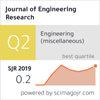Direct flame test performance of boards containing waste undersized pumice materials
IF 0.9
4区 工程技术
Q3 ENGINEERING, MULTIDISCIPLINARY
引用次数: 0
Abstract
This study investigates the thermal performance of boards containing waste undersize pumice material directly exposed to flame in terms of thermal conductivity coefficient (TCC) and thermal efficiency ratio (TER). In the study, the direct flame was applied for 60 s on the front face of the 400×400×25 mm boards whose weight and density values, void ratio, porosity, and water absorption rates by weight and volume were determined. Because moisture content and porosity are significant factors in defining temperature-related properties of construction materials. The thermal characteristics of the boards were interpreted in this regard in connection to their moisture content and void ratios. At the end of the tests, the temperature difference between the front and back surfaces of the boards containing 10%, 30%, and 50% by weight of pumice stone powder and pumice sand was measured using a laser pyrometer. Compared to the reference sample without pumice, the TCC values decreased to 1.653, 1.649, and 1.540 W/mK, respectively, as a result of the use of pumice products in building materials. Moreover, TER values for the same samples increased to 82.6 %, 83.5 %, and 85.3 %, respectively.
含有尺寸不足的废浮石材料的木板的直接火焰测试性能
本研究从热传导系数(TCC)和热效率比(TER)两个方面研究了直接暴露在火焰下的含有未达尺寸浮石废料的板材的热性能。在研究中,直接火焰在 400×400×25 毫米板材的正面照射 60 秒,测定了板材的重量和密度值、空隙率、孔隙率以及重量和体积吸水率。因为含水率和孔隙率是确定建筑材料温度相关特性的重要因素。在这方面,根据木板的含水率和空隙率来解释木板的热特性。试验结束后,使用激光高温计测量了浮石粉和浮石砂含量分别为 10%、30% 和 50%(按重量计)的木板正反两面的温差。与不含浮石的参考样本相比,由于在建筑材料中使用了浮石产品,TCC 值分别降至 1.653、1.649 和 1.540 W/mK。此外,相同样本的 TER 值分别增至 82.6%、83.5% 和 85.3%。
本文章由计算机程序翻译,如有差异,请以英文原文为准。
求助全文
约1分钟内获得全文
求助全文
来源期刊

Journal of Engineering Research
ENGINEERING, MULTIDISCIPLINARY-
CiteScore
1.60
自引率
10.00%
发文量
181
审稿时长
20 weeks
期刊介绍:
Journal of Engineering Research (JER) is a international, peer reviewed journal which publishes full length original research papers, reviews, case studies related to all areas of Engineering such as: Civil, Mechanical, Industrial, Electrical, Computer, Chemical, Petroleum, Aerospace, Architectural, Biomedical, Coastal, Environmental, Marine & Ocean, Metallurgical & Materials, software, Surveying, Systems and Manufacturing Engineering. In particular, JER focuses on innovative approaches and methods that contribute to solving the environmental and manufacturing problems, which exist primarily in the Arabian Gulf region and the Middle East countries. Kuwait University used to publish the Journal "Kuwait Journal of Science and Engineering" (ISSN: 1024-8684), which included Science and Engineering articles since 1974. In 2011 the decision was taken to split KJSE into two independent Journals - "Journal of Engineering Research "(JER) and "Kuwait Journal of Science" (KJS).
 求助内容:
求助内容: 应助结果提醒方式:
应助结果提醒方式:


